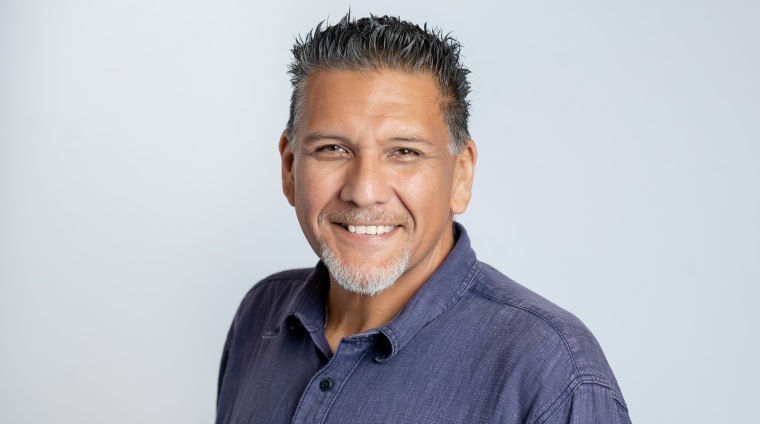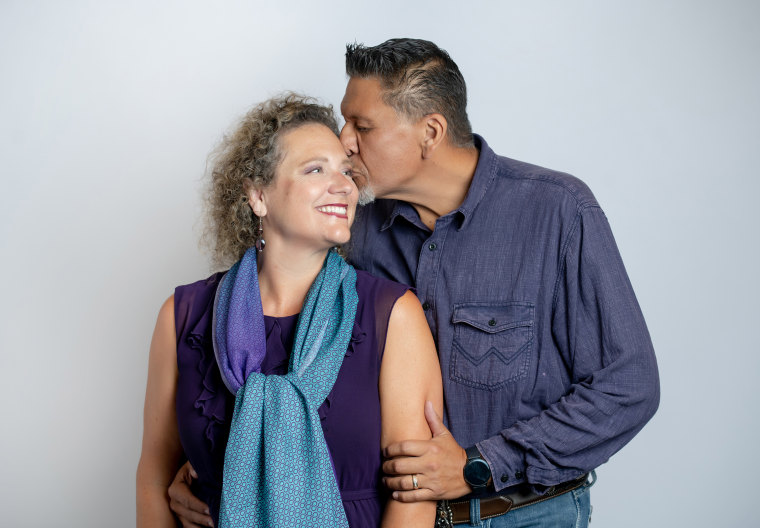At age 45, Tony Gonzales knew something was wrong. A life-long resident of Santa Maria, California, he spent 25 years as a radio broadcaster followed by successful careers in real estate and as a community development manager for the American Cancer Society.
He excelled at multitasking until a few years ago, when juggling work responsibilities became difficult. At first, he thought his forgetfulness was due to his son’s upcoming wedding. But he realized it was more serious when he got lost one day on his way home from work.
“I had driven this route a gazillion times,” he tells TODAY.com. “Suddenly I had no idea where I was, where I had been or where I was going. I needed to call my wife for help.”

Brain fog from poor sleep?
After he failed a simple memory test, Gonzales' primary care physician referred him to a neurologist. He underwent an eight-hour neuropsychological evaluation, MRI and a spinal tap. These tests did not reveal any biomarkers for Alzheimer’s disease, so the neurologist diagnosed Gonzales with sleep apnea.
“Poor quality of sleep can cause brain fog,” Gonzales says. “I was overweight, didn’t sleep well, and the sleep apnea diagnosis was correct. Still, my wife and I noticed something was wrong.”
After gastric bypass surgery, Gonzales lost 165 pounds, changed his diet and started exercising.
“I felt better,” he says. “However, my cognition issues continued. I had gone from being CEO of a real estate company managing finances to struggling to do first grade math.”
He spent more time getting additional evaluations. In 2021, at age 47, his doctors diagnosed him with early-onset Alzheimer's.
“I felt a mixture of relief and fear,” Gonzales recalls. “Relief because the doctors were seeing what I was feeling and fear because I had witnessed dementia in some of my older family members.”
He quit his job and spent a week with his wife, Kori, devising a plan. They joined an early-stage support group at the Alzheimer’s Association and launched a video series called “The Empty Nesters,” which documents their travel adventures. Kori Gonzales, who worked as a special education teacher, also documents their journeys with early-onset Alzheimer’s on YouTube.

Instead of giving into his fears, Gonzales is "focusing on the positives," he says. "While most people look at the late stages of this disease, my focus is on the early stages. My aim is to educate as many people as possible about this disease.”
"Dementia is a horrible disease, and I wish I didn’t have it, but it provided me with an opportunity to use my voice to make a difference,” he adds.
As a member of the Alzheimer’s Association’s 2022-2023 National Early-Stage Advisory Group, Gonzales educates others about the importance of early detection and diagnosis, especially those in the Hispanic community.
“This is my background, and I know the men are macho, yet they don’t advocate for themselves,” he says. “With this disease, advocacy is a must.”
'I knew something was wrong'
Betsy Groves, 73, who has Alzheimer's, noticed her organizational skills and memory becoming faulty in her 60s. “It was more than simple forgetfulness that comes with aging,” she tells TODAY.com.
At the time, she was teaching at Harvard University’s Graduate School of Education. But she noticed that “I wasn’t as sharp and on my toes in classroom discussions,” she recalls.
Her longtime primary care physician told her memory loss was a normal part of aging and assured her that her years of higher education would protect her from cognitive decline.
Still, work grew more difficult, and Groves became anxious. “I respected my doctor,” she says. “Yet, I knew something was wrong.”
Groves talked with a friend in the medical profession, who helped her set up a neuropsychological evaluation. The results showed she had early-onset Alzheimer’s.
Fortunately, Groves has a strong support system. “I worried sharing my diagnosis would change how people would treat me,” she says. “Those fears were unfounded. My family and close friends are here for me.”
Like Gonzales, Groves took action and became an advocate by joining the Alzheimer’s Association’s 2022-2023 National Early-Stage Advisory Group.
Early-onset Alzheimer's or just regular aging?
When a person is diagnosed with Alzheimer's disease before age 65, it's called early onset or younger onset, according to Johns Hopkins Medicine. These patients are often in their 40s or 50s, and their dementia can be at any stage — early, middle or late, according to the Alzheimer's Association. Early-onset Alzheimer's makes up less than 10% of people with the condition, according to an estimate from the National Institute on Aging.
“(Alzheimer's) is a progressive disease with no cure,” Beth Kallmyer, vice president of the Alzheimer’s Association, tells TODAY.com. “Early intervention can slow it down. That’s why it’s important for an early diagnosis.”
But, as the Alzheimer's Association notes, for patients living with early-onset Alzheimer's, getting the correct diagnosis can be difficult. Health providers don't often look for the condition in young people — even though the brain starts to lose some capacity to function as early as age 30, Dr. William T. Hu, chief of cognitive neurology at Rutgers-Robert Wood Johnson Medical School, tells TODAY.com.
To explain what this decreased function may look like, he points to how when you're in your 20s, you have an easier time getting things done when you're sick than when you're in your 60s. Time changes, lack of sleep and dehydration may also affect you more as you age.
"Changes ... can be subtle, as well as major," Hu says. "Early-onset Alzheimer’s patients have good days and bad ones. We only see our patients for a brief period. It’s important to talk to and listen to the patient’s family members. These are the people who see these changes.”
When a patient tells Hu they sometimes forget dates or which word to use in a sentence, he tells them that’s typical aging. Losing track of a season or having difficulty conversing could be dementia-related.
“See a subspecialist if your primary care doctor doesn’t listen to you,” Hu says. “It’s important to be your own advocate. Find another primary care doctor or make an appointment with a neurologist.”